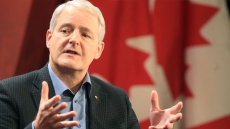OTTAWA — Fewer Canadian mothers — especially those with young children — participate in the job market compared to moms in many wealthy countries, says a newly released internal federal analysis.
The Finance Department briefing note, prepared after the Liberals took power, also found that the workforce participation rates of Canadian mothers varied considerably depending on the province.
The document explored the link between child-care support and the involvement of women in the labour market.
It was created after last year's election campaign, during which the Liberals vowed to work with provinces, territories and indigenous communities to draw up a national framework on early learning and child care.
The Trudeau government's first spring budget committed $500 million in 2017-18 toward the framework's creation.
The Liberals have promised the initiative would avoid a "one-size-fits-all" national program, and instead consider the approaches used by different jurisdictions across Canada to address their respective child-care needs.
The government's detailed internal analysis, "The impact of childcare support on women's labour force participation," provides information that could add valuable context to such discussions.
Based on 2013 data, it said the employment rate for "prime-aged" Canadian women — between 25 to 54 years old — with kids younger than 15 years old was 75 per cent.
That number placed Canada ninth among fellow member countries in the Organization for Economic Co-operation and Development, a prominent Paris-based think tank.
"Canadian women with children are less involved in the labour market than women in many OECD countries," said the partially redacted briefing note, obtained recently by The Canadian Press under the Access to Information Act.
"In particular, prime-aged Canadian women with young children (aged less than six years) stand out as a group."

The document said the factors behind the participation rate of women in Canada with young children was connected to several interrelated factors, including education attainment, spouse's income, labour market conditions, tax rates, child benefits and the availability of affordable child care.
By province, the document said that maternal labour force participation was, in most cases, lower in provinces with higher child-care costs — with some exceptions.
It said Ontario, Newfoundland and Labrador, British Columbia and Alberta had the highest child-care fees, while Quebec, Manitoba and Prince Edward Island had the lowest costs.
"Relatively large participation gaps observed for mothers with young children in Ontario, British Columbia, Alberta and Newfoundland and Labrador are broadly consistent with higher child-care fees observed in these provinces," said the memo, which was prepared for deputy finance minister Paul Rochon.
It noted that evidence has shown jurisdictions with lower-cost child care, such as Quebec and other OECD countries, has helped lift the workforce participation rates of women.
But despite having relatively low child-care costs, Manitoba and Saskatchewan still had comparably low participation rates among provinces, the document said.
The paper notes that it's difficult to quantify the link between low-cost child care and labour-force participation because of other variables, such as the design of the subsidy, the economic context and the availability of daycare spaces.
The document also highlighted a "strong regional differentiation" across provinces that persists even after education is factored in.
It noted a big gap between the lower workforce participation of women who had not completed post-secondary diploma, certificate or degree compared to those who had.
For example, the memo said in 2014 the provincial participation rates among prime-aged women without a post-secondary education, and whose youngest child was under six years old, ranged from 48 per cent in Newfoundland to 75 per cent in P.E.I.
Among their counterparts who had completed a post-secondary education, the rates ranged from 73 per cent in Alberta to 89 per cent in P.E.I.
The briefing also assessed how much lowering child-care fees could potentially increase Canada's labour supply. Drawing a clear conclusion, however, wasn't easy.

It said generating a boost in the labour-force supply by expanding low-cost daycare would depend on many factors, such as acceptable hours, quality of services and convenience of location.
On top of that, job opportunities must be attractive enough for women to cover the costs of child care, the analysis said.



